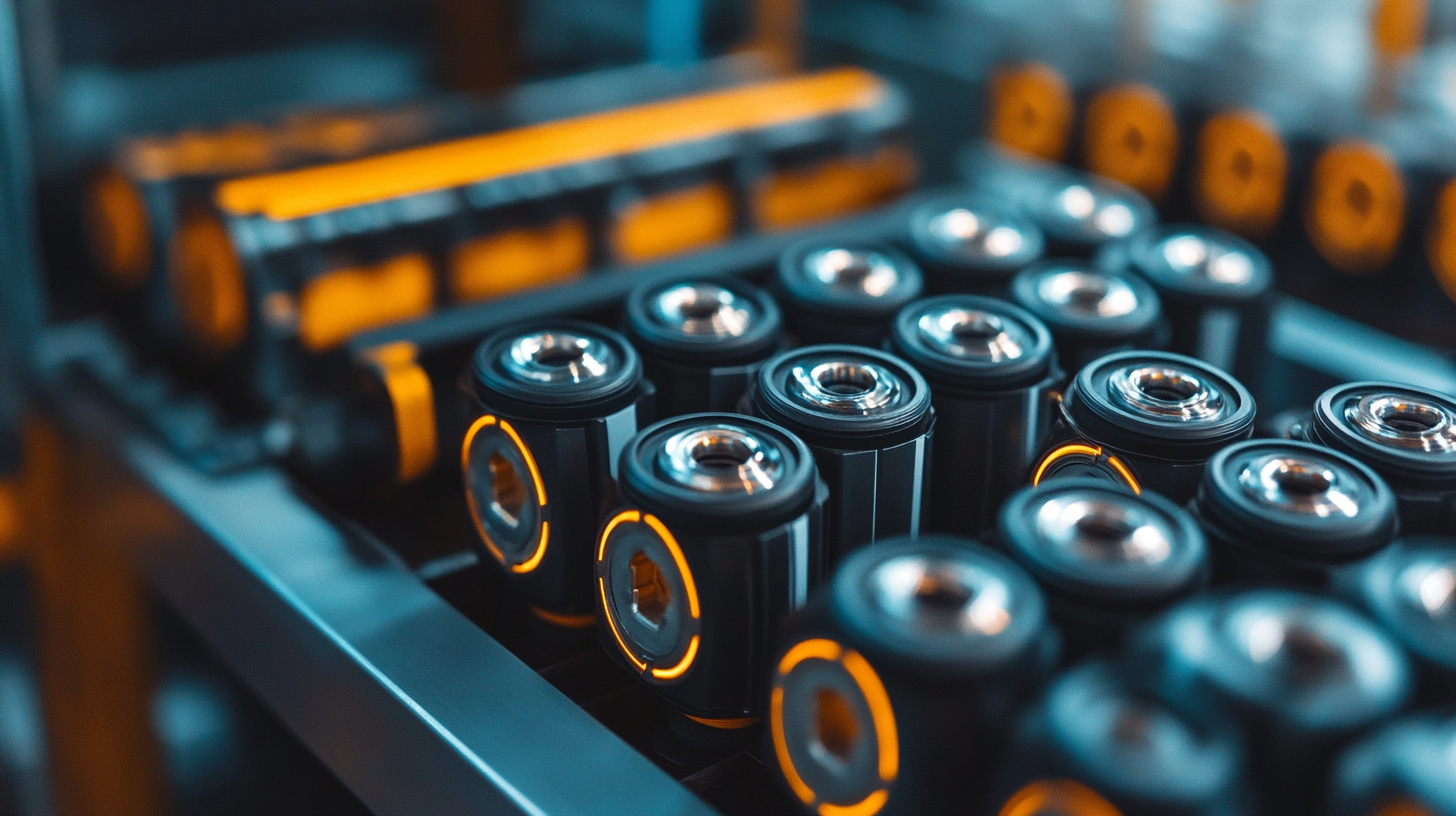Leave Your Message
In today's rapidly evolving energy landscape, the demand for efficient and powerful battery solutions is greater than ever. Among the various battery technologies available, the 18650 battery stands out due to its versatility and performance. This explains why many businesses are considering the implementation of a 18650 Battery Pilot Line. Investing in such a pilot line not only allows companies to enhance their production capabilities but also offers a range of strategic benefits that can significantly impact their competitive edge. From optimizing manufacturing processes to improving product quality and accelerating time to market, the advantages are numerous. In this blog, we will explore the five key benefits of establishing a 18650 Battery Pilot Line for your business, demonstrating how this investment can propel your operations to new heights in the growing battery market.

In today's rapidly evolving technological landscape, the significance of 18650 batteries cannot be overstated. These cylindrical lithium-ion cells have become a cornerstone for various applications, particularly in electric vehicles (EVs) and energy storage systems. As highlighted in recent reports, the energy density and safety of battery technologies are critical, with cutting-edge research focused on mitigating thermal runaway and improving performance. Investing in a 18650 battery pilot line is not just about keeping up with the competition; it's about mastering the core technology driving modern innovations in energy solutions.
As companies like Kia opt for ternary lithium batteries in their budget-friendly EV3 model, the demand for efficient and reliable 18650 batteries surges. With the global rare earth metals market expected to see a compound annual growth rate exceeding 10.8% from 2024 to 2032, the time is ripe for businesses to establish a robust battery production line. This will ensure they are well-positioned to meet the increasing energy storage demands while maintaining safety and performance standards.
**Tips:** To enhance battery safety, focus on developing robust thermal management systems. Additionally, staying updated with the latest energy storage technologies and market trends can provide your business with a competitive edge. It's crucial to align your production capabilities with emerging standards and consumer expectations to thrive in this dynamic sector.
Establishing a dedicated pilot line for 18650 battery production can offer significant advantages for businesses venturing into this rapidly growing market. According to a report by MarketsandMarkets, the lithium-ion battery market is projected to reach $129.3 billion by 2027, growing at a compound annual growth rate (CAGR) of 15.5%. Setting up a pilot line allows companies to streamline their manufacturing processes while also enabling them to experiment with new technologies and formulations without the high costs associated with full-scale production.
Moreover, a pilot line fosters innovation by allowing businesses to trial new production methods and materials, adapt quickly to market demands, and refine their products before a full rollout. Statistics from Technavio indicate that the global demand for 18650 batteries is expected to increase significantly, with a projected market growth of over $50 billion from 2022 to 2026. Companies that invest in a dedicated pilot line can thus position themselves competitively, ensuring they meet not only current consumer needs but also future technological evolutions. This strategic investment minimizes risks and maximizes potential returns, making it an essential step for businesses serious about the battery production landscape.

Investing in a 18650 battery pilot line can significantly enhance quality control and product consistency, which are paramount in today’s competitive market. A pilot line allows businesses to test and refine their production processes before full-scale manufacturing, thereby identifying potential inefficiencies and quality issues early on. This proactive approach helps ensure that every battery produced meets stringent safety and performance standards, reducing the risk of recalls and fostering customer trust.
By employing advanced monitoring systems within the pilot line, manufacturers can gather real-time data on every phase of production. This data-driven insight enables them to make informed adjustments, ensuring consistent output. Additionally, pilot lines facilitate the adoption of innovative techniques and technologies, allowing companies to stay ahead of industry trends while maintaining high-quality products. Ultimately, the integration of a pilot line not only optimizes quality control but also reinforces a brand’s reputation for reliability and excellence in battery production.
| Benefit | Description | Impact on Business |
|---|---|---|
| Quality Control | Implementing a pilot line allows for rigorous testing and quality assurance of battery production. | Ensures high-quality products, reducing rejects and returns. |
| Product Consistency | Standardized processes lead to uniform product output in terms of performance and safety. | Improves brand reputation and customer satisfaction. |
| Reduced Time to Market | Pilot lines enable rapid prototyping and testing, speeding up the product development cycle. | Gains competitive advantage by launching products faster. |
| Cost Efficiency | Identifying issues early in production leads to lower costs associated with mass production defects. | Enhances profit margins through lower waste and rework rates. |
| Innovation Opportunities | Pilot lines provide a platform for testing new technologies and formulations. | Positions the company as a leader in industry advancements. |
Investing in a 18650 battery pilot line can significantly enhance cost efficiency and yield substantial long-term savings for businesses. According to a recent report by ResearchAndMarkets, the global lithium-ion battery market is expected to reach $193 billion by 2025, with 18650 batteries being a major segment due to their widespread applications in electronics and electric vehicles. By establishing an in-house production line, companies can circumvent the substantial costs associated with outsourcing, which often include shipping fees, import tariffs, and fluctuating supplier prices. Instead, they can leverage localized production to respond quickly to market demands, minimizing overheads and maximizing operational agility.
Furthermore, owning a pilot line facilitates comprehensive quality control and innovation flexibility. A study published by the International Energy Agency revealed that companies investing in advanced battery technology can reduce production costs by as much as 30% through optimized manufacturing processes. This not only lowers the cost per battery unit but also promotes sustainable practices by allowing companies to experiment with different materials and techniques. In-house pilot lines contribute to a faster innovation cycle, enabling businesses to keep pace with rapidly evolving market trends without the delays associated with third-party production. Such strategies position businesses for scalable growth while enhancing their competitive edge in a continuously expanding battery market.

Investing in a 18650 battery pilot line represents a strategic move for businesses looking to maintain their competitive edge in today's rapidly evolving technological landscape. The demand for energy-efficient solutions is surging, particularly in the electric vehicle and renewable energy sectors. By integrating advanced battery technology, companies can not only enhance their product offerings but also position themselves as leaders in innovation. This proactive approach allows businesses to respond more swiftly to market changes and customer preferences, ultimately leading to greater brand loyalty.
Moreover, establishing a pilot line dedicated to 18650 batteries enables businesses to streamline their production processes and reduce costs. With the ability to experiment with different formulations and production techniques, companies can optimize efficiency and improve product performance. This adaptability is crucial in an industry where technological advancements occur at breakneck speed. By investing in cutting-edge battery technology, businesses not only secure their current market position but also pave the way for future growth opportunities, reinforcing their commitment to sustainability and excellence.
This pie chart illustrates the major benefits of investing in a 18650 battery pilot line, showcasing how each advantage contributes to staying competitive in the battery technology market.
